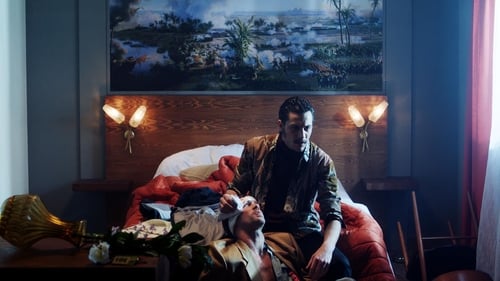Neil Beloufa
Рождение : 1985-01-01, Paris, France

Director
Reality TV—a political form in which a group of isolated people disagree and compete—is one of the dominant clichés of Western representation. Shot in Iran, where reality shows are not yet widespread, Restored Communication stages candidates cut off from the world, who replay different seizures of power in various political contexts. In this system, as artificial as it is liberal, the competitors are locked up, filmed without interruption and subjected to the injunctions of a voice-over. Deprived of food, the voice, and contact with the outside world, they seem helpless, reflecting the stereotypical image of Iran’s geopolitical isolation. Between schoolboyish fiction and documentary, the film slowly turns into a scathing genre film in which even a water pistol can kill.

Screenplay
The mood is heated. Demonstrations are taking place across France, also in front of the Paris hotel where an Italian named Giorgio is booking the bridal suite for him and his boyfriend Antonio. Hotel manager Diana doesn’t trust them and calls the police to get rid of the odd couple. Italians? Homosexuals? Criminals? In the charged atmosphere of the Hotel Occidental, little is needed for initial suspicions to be aroused.

Director
The mood is heated. Demonstrations are taking place across France, also in front of the Paris hotel where an Italian named Giorgio is booking the bridal suite for him and his boyfriend Antonio. Hotel manager Diana doesn’t trust them and calls the police to get rid of the odd couple. Italians? Homosexuals? Criminals? In the charged atmosphere of the Hotel Occidental, little is needed for initial suspicions to be aroused.

Director
In Canada, at a night-time garden party, a group of young adults are busy chatting each other up; Dylan and Molly seem unable to get over their break-up, Carly has Dylan in her sights, Molly is seducing Noel to rouse his ex’s jealousy; as for Michelle, she is speaking to Charlie about their one-night fling… Already interspersed by individual daytime interviews, where each envisages his or her near future, this chronicle of an ordinary party is suddenly analysed, manipulated, tabulated: a group of young French statisticians note the attractions, signs of seduction, and anticipate the probability that couples will form.

Director
Vengeance emerges from a collaboration between Neïl Beloufa and a group of junior students from the banlieue of Paris. The failure of the film’s original process is incorporated in the final result, which reflects on the limits and challenges of artistic social practices.

Director
In an imaginary Los Angeles, a bunch of cow-boys, a group of activists, three hippies, four teenagers and a few gangsters are waiting for a major event that is supposed to happen tonight. Meanwhile, they talk about their values, dreams, ideal lovers, and about how politics affect their lives.

Director
A car in an underground garage is the start of an 'approximate fiction'.

Writer
Untitled is an investigation into an anecdote the artist heard about a house near Algiers: that it was abandoned by its wealthy owners during the political unrest in the 1990s and occupied by a terrorist group. The idyllic landscape we are shown is in fact a series of full-scale inkjet prints, which the artist photographed and used to wallpaper a life-size model of the house for his film set. Actors playing the landlord of the house, the gardener and the neighbors give conflicting accounts of what the terrorists had done there, how they lived, how they ate. More importantly, they question why the group chose to live in a house with floor-to-ceiling glass windows on all sides. This re-imagined scene is typical of Beloufa’s exploration of the hazy shades of narrative, make-believe and truth that underpin the representations of real-world events.

Director
Untitled is an investigation into an anecdote the artist heard about a house near Algiers: that it was abandoned by its wealthy owners during the political unrest in the 1990s and occupied by a terrorist group. The idyllic landscape we are shown is in fact a series of full-scale inkjet prints, which the artist photographed and used to wallpaper a life-size model of the house for his film set. Actors playing the landlord of the house, the gardener and the neighbors give conflicting accounts of what the terrorists had done there, how they lived, how they ate. More importantly, they question why the group chose to live in a house with floor-to-ceiling glass windows on all sides. This re-imagined scene is typical of Beloufa’s exploration of the hazy shades of narrative, make-believe and truth that underpin the representations of real-world events.

Director
Kempinski is a mystical and animist place. People emerge from the dark, holding fluorescent lamps; they speak about a magical world. “Today we have a space station. We will launch space ships and a few satellites soon that will allow us to have much more information about the other stations and other stars.” Their testimonies spark confusion and contradiction: a second reading is necessary to fully understand what is going on in this unique blend of fiction (sci-fi) and ‘real’ documentary. The scenario of ‘Kempinski’, filmed in various towns in Mali, is defined by specific rules: interviewed people imagine the future and speak about it in the present tense. Their hopeful, poetic and spiritual stories and fantasies are recorded and edited in a melod…








